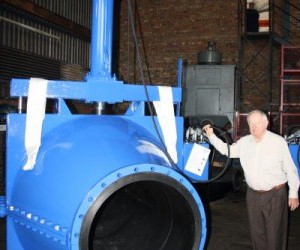South African pinch valve and knife gate valve manufacturer Atval has successfully manufactured and delivered three 800 mm pinch valves for AngloGold Ashanti – the largest type of valve ever manufactured by the Johannesburg-based company.
The valves were delivered onsite in September 2012 to the AngloGold Ashanti Siguiri mine in Guinea, West Africa, to enable the project to increase its production from nine million tons per year to 12 million tons per year. The Siguiri mine is AngloGold Ashanti’s only operation in Guinea, where the government has a 15% stake in the mine and the balance of 85% being held by AngloGold Ashanti. In 2006, the mine produced 256,000 attributable ounces of gold at total cash cost of $399 per ounce.
Atval director Ted Atkins notes that the project was completed within four months and comprised the design, tooling, manufacturing and testing of the valves. "The 800 mm nominal bore 10 bar KE series pinch valves, with enclosed body design, were fitted with B-grade heavy-duty natural rubber sleeves. The valves were installed on the ring main of the Siguiri gold plant’s tailings facility, where AngloGold Ashanti increased its pipeline from 700 mm to 800 mm in diameter to accommodate the increase in production," he explains.
Atval director Mark Atkins indicates that pinch valves were used in this application, owing to their longevity in high-wear applications. "The valves were fitted with double acting hydraulic cylinders, which were manually actuated by hydraulic hand pumps that were welded to the side of the valves."
He highlights the fact that the requirement for pinch valves in South Africa is rarely greater than 500 mm. “Larger valves are generally used in applications where there are low yields of precious metals in the rock. We had previous experience in manufacturing an 800 mm valve to assist with water distribution in the Lowveld of Mpumalanga. The expertise gained from that project helped us successfully complete the AngloGold Ashanti project."
Atval manufactures all its own valves, as well as the tooling and testing needed to ensure a successful product. Mark continues: “This is an advantage that Atval has over its competitors, as it can react quickly to requests for new designs, for valves not previously manufactured. This is supported by well proven design formula and design calculations as required under the companies ISO 9001/2008 certification. This is what ultimately contributed to Atval being chosen by AngloGold Ashanti for its Siguiri project."
According to Ted, Atval had to manufacture all the tooling required for the production of the valves. Once the tooling was completed, in-house machinery had to be built to handle the manufacturing process. He adds: "The company’s plant is built to handle the manufacturing of valves up to 1 000 mm and the technology is capable of manufacturing large sizes.
Despite a number of serious challenges related to the South African valves market with regards to labour unrest in the mining sector and overall energy price-hikes, Mark does note that the Department of Trade and Industry (DTI) formally announced in January 2013 the further designation of valves, manual and pneumatic actuators, electrical and telecommunication cables as well as components of solar water heaters for local production and content in the public sector procurement system.
The Minister of Trade and Industry, Dr Rob Davies signed the necessary authorisation in terms of his powers under the Amended Regulations of the Preferential Procurement Policy Finance Act (PPPFA). The National Treasury will in due course circulate the instruction notes which will regulate the environment within which government departments and public entities may procure designated products.
Public procurement is one of the key industrial levers in the Industrial Policy Action Plan (IPAP). The revised Preferential Procurement Policy Framework Act (PPPFA) regulations which came into effect in December 2011 empower the Minister of Trade and Industry to designate industries, sectors and sub-sectors for local procurement at specified levels of local content.
The designation policy instrument is one of a suite of policy levers designed to maximise support for domestic manufacturing. The others are the Competitive Supplier Development Programme (CSDP) which is led by the Department of Public Enterprises and governs the procurement programmes of State Owned Companies (SOCs) and the National Industrial Participation Programme (NIPP). This instrument obliges overseas companies which have won tenders worth more than US$10 million to provide ‘offset’ obligations through investments in the domestic economy.
The Department of Trade and Industry is confident that local production of designated products will help to stimulate aggregate demand and strengthen support for the domestic manufacturing sector. In so doing, the deployment of procurement policy levers is an added incentive for foreign direct investment in the production sectors of the economy.
“In the year ahead the dti will significantly scale up designations and other procurement policy levers in support of domestic manufacturing. This will be done at the same time as the dti deploys a range of other supportive and inter-locking instruments to raise the competitiveness of South Africa’s manufacturers. This will be done in close collaboration with business and labour,” says Minister Davies.
Mark highlights the fact that Atval has been working closely with the dti over the past 18 months regarding this initiative. “This initiative will help create employment and develop the valves and associated industries. With this in mind, Atval aims to target more aggressively State owned enterprises, such as those involved in water and power generation, in the near future," he concludes.






